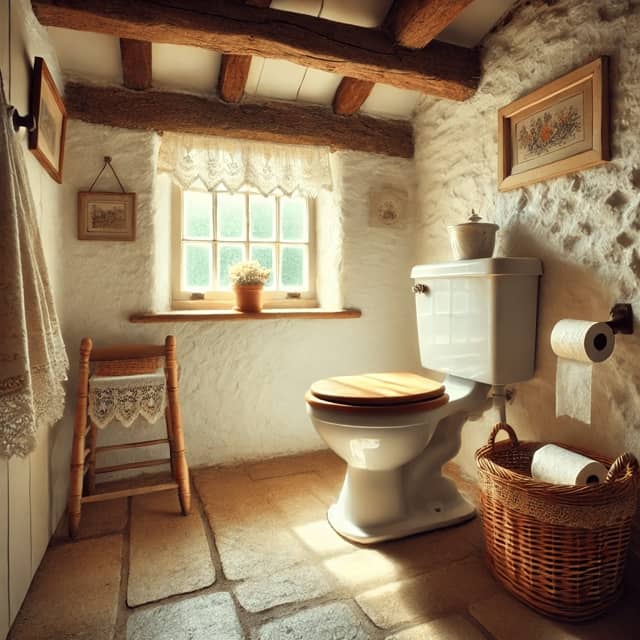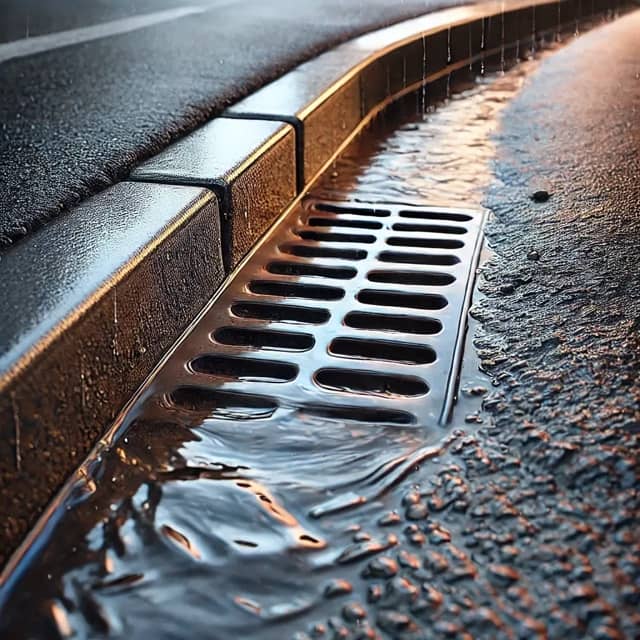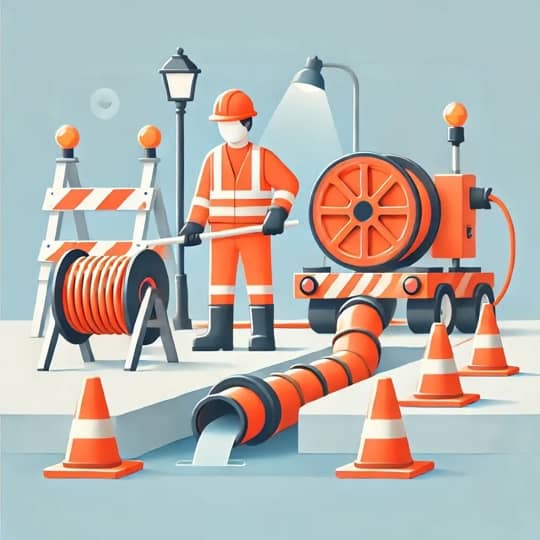What starts as a small nuisance can become a major headache with blocked drains. This is particularly the case during wet weather.
To learn more look at our main drain unblocking page.
Typical Reasons for Blocked Drains in Lincoln Green
In Lincoln Green, drainage systems, experience blockages caused by various factors, typically linked to everyday routines. Some typical causes are:
Build-Up of Grease and Fat
Kitchen drain blockages are often caused by fat, oil, and grease. They tend to harden in the pipes as they cool, eventually building up and restricting water flow.
Over time, this can lead to complete blockages, causing water to back up. In Lincoln Green, this is particularly common in takeaway establishments.
Hair Buildup and Soap Residue
Bathroom drains often suffer from hair and soap scum forming clogs. This buildup can block the flow of water, resulting in slow drainage or standing water.
Improperly Disposed Items
Things like wipes, toys, or sanitary products can cause serious pipe blockages.
Unlike toilet paper, these items don’t disintegrate in water and can cause major blockages.
External Debris and Tree Roots
Tree roots and autumn debris, such as leaves, can block outdoor drains in Lincoln Green. This often results in severe drainage problems, especially in wet weather.

Indicators of Drain Blockages
These signs indicate that you should reach out to a drain unblocking service in Lincoln Green:
Slow Flowing Water
Slow-draining sinks, baths, or showers often indicate a blockage.
Foul Odours
Odours from your drains can signal a blockage due to decomposing waste or trapped debris.
Strange Drain Noises
Unusual noises from drains indicate air is escaping past a blockage.
Standing Water or Overflowing Drains
If water starts to pool in sinks, baths, or external drains, or if drains begin to overflow, this is a more serious indication of a major blockage.
Expert Drain Unblocking in Lincoln Green
When faced with a blocked drain, professional help is often the best and quickest way to resolve the issue. After checking with Lincoln Green council and Leeds City Council, it might be time to call a professional.
Powerful Water Jetting
High-pressure water jetting effectively clears blockages from drains. This involves blasting water at high speed through the pipes to dislodge and clear away blockages caused by grease, debris, or tree roots.
It’s a thorough and eco-friendly method that doesn’t use chemicals.
Snaking and Augering
Drain snakes or augers are suitable for smaller, more localised blockages.
These tools are flexible and break up clogs from hair, soap, or objects.
Camera Inspections of Drains
If the cause of the blockage isn’t immediately clear, a CCTV drain survey may be carried out.
The process uses a camera to detect blockages and examine pipe health.
Drain Repairs
Blockages sometimes stem from serious issues like broken pipes. These services restore the system to good working condition.

Lincoln Green: A Vibrant Leeds Neighborhood with Drainage Challenges
Lincoln Green, located near Leeds city center, is a bustling, diverse residential area known for its close proximity to St James’s University Hospital.
Established during a redevelopment phase in the 1950s, Lincoln Green features a mix of tower blocks and low-rise flats, replacing older terraced housing. With its rich cultural diversity and urban vibrancy, Lincoln Green remains an essential part of Leeds’s cityscape.
However, the dense urban environment also presents unique challenges, including the need for effective drainage maintenance.
The Importance of Drainage in Lincoln Green
Given its population density and urban infrastructure, Lincoln Green faces potential drainage issues such as blocked drains and water pooling.
Common causes of blockages in residential areas include:
- Flushing unsuitable items like wet wipes, nappies, or sanitary products.
- Pouring grease or food waste down the sink, which can solidify in pipes.
- Debris build-up in outdoor drains, especially after heavy rainfall.
Addressing these issues promptly is crucial to prevent unpleasant odors, waterlogging, and property damage.
Residents can take simple steps like clearing debris from outdoor drains and avoiding misuse of indoor plumbing.
Who Handles Drainage Issues in Lincoln Green?
- Tenants: Responsible for unblocking drains caused by misuse, such as hair or soap clogs in bathroom drains.
- Landlords: Handle structural drainage problems, like collapsed pipes or long-term wear and tear.
- Leeds City Council: Manages public drains and sewers in communal areas. For issues beyond property boundaries, residents can report blockages to Leeds City Council or Yorkshire Water (yorkshirewater.com). (Weather in Lincoln Green)
Maintaining Effective Drainage
Lincoln Green residents can stay proactive by:
- Monitoring for early signs of blockages: Slow-draining sinks or unpleasant smells often signal problems.
- Clearing debris regularly: Outdoor drains should be kept free of leaves, soil, and other obstructions.
- Reporting public drainage issues: Use resources like Leeds City Council’s drainage page for guidance.
Why Drainage Maintenance Matters
Proper drainage not only keeps properties safe but also ensures Lincoln Green remains a pleasant place to live.
Efficient water management supports the area’s infrastructure and prevents potential health risks, making drainage maintenance a priority for this vibrant community.
For more information about managing drainage in Lincoln Green, consult Yorkshire Water or Leeds City Council.

Who Is Responsible for Unblocking Your Drain in Lincoln Green: Tenant, Landlord, or Local Council?
In Lincoln Green, Leeds, determining who is responsible for unblocking a drain depends on the cause and location of the blockage.
Whether it’s the tenant, landlord, or local council, understanding these responsibilities can save time and avoid unnecessary complications.
Tenant Responsibility
Tenants in Lincoln Green are generally responsible for addressing blockages caused by improper use or day-to-day activities. Common examples include:
- Flushing inappropriate items such as wet wipes, nappies, or sanitary products.
- Pouring grease or cooking oils down the sink, which can harden and clog pipes.
- Allowing hair or soap residue to accumulate in bathroom drains.
Tenants are encouraged to take preventive measures, like using drain strainers and disposing of waste properly.
Managing minor blockages, such as clearing a slow-draining sink, typically falls under the tenant’s responsibilities.
Landlord Responsibility
Landlords are accountable for maintaining the overall drainage system and addressing major structural issues.
This includes:
- Repairing collapsed or damaged pipes.
- Resolving long-term blockages caused by tree roots or aging infrastructure.
- Ensuring the drainage system is in good working order at the start of a tenancy.
If a blockage arises due to wear and tear or poor installation, it is the landlord’s responsibility to arrange for repairs.
Local Council Responsibility
For blockages outside private property boundaries, Leeds City Council or Yorkshire Water may be responsible.
This typically includes:
- Maintaining public sewers and drainage systems in communal or public areas, like roads or shared spaces.
- Clearing blockages in main sewer systems that serve multiple properties.
If you suspect a blockage is in a public sewer, contact Yorkshire Water (yorkshirewater.com) or Leeds City Council for assistance.
Steps to Handle Drainage Issues in Lincoln Green
- Check your tenancy agreement: This document outlines specific responsibilities for tenants and landlords.
- Identify the location of the blockage: If it’s beyond your property boundary, report it to Yorkshire Water or Leeds City Council.
- Act quickly: Promptly addressing drainage problems helps prevent larger issues.

